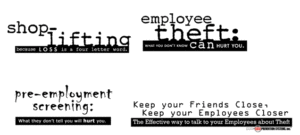 Employee theft is a common and costly problem in retail. Some businesses’ are reporting that, for the first time, internal pilferage has now surpassed external. There are many ways to control and manage internal theft. But, one of the most effective ways is often overlooked. Stop it before it starts.
Employee theft is a common and costly problem in retail. Some businesses’ are reporting that, for the first time, internal pilferage has now surpassed external. There are many ways to control and manage internal theft. But, one of the most effective ways is often overlooked. Stop it before it starts.
Many companies have the misconception that “management” starts after someone is hired. But, good management practices start before the employee is ever hired. They start when the candidate is sitting in her first interview.
Companies who’re committed to integrity understand that from the moment the potential hire encounters the company (i.e., website, employment application, recruiter, Human Resources) he should know that the company values honesty. Values it and is activity looking for employees who do too.
When a business makes it a priority and emphasizes it as a condition of employment, dishonest people will start to be weeded out. Some will self select — they’ll become uninterested in the job and move on to a less stringent company. Or if they think they can cheat the system, make it difficult for them to get through the hiring process.
One way to get people to fall by the wayside is to have an up-to-date written drug free workplace policy, which includes rigorous pre-hire testing. The applicant must sign it and follow through with the testing. Many will sit in the interview, say they agree with the policy and never go for the testing. Or, of course, fail it.
Another way to screen for honesty is to let people know up-front, clearly and in bold letters that the company has a firm policy of checking references, education and work history. It may also check on credit and criminal history, depending on the job requirements.
People are blatant about their dishonesty, they count on nobody checking — make sure they know your company does. They’ll walk away and not even attempt to apply for the job or will be caught in their deception when their information is checked.
Be very careful about using social media in hiring practices. It shouldn’t be used as a shortcut. It’s not a substitute for due diligence and good procedures. If an interviewer doesn’t hire a woman because they found out through Facebook she was pregnant, the company is in violation of the law.
The laws concerning the applicants’ “right to privacy” and potential employers’ “right to know” are just starting to be written. Many legal experts are encouraging businesses to err on the side of caution and use only legally established hiring methods. Don’t let your company become the test case to make new law.
Nicole Abbott is a professional writer who’s had over 200 articles published. She’s a business consultant and former psycho-therapist with over 20 years of experience in mental health, business and addiction. She’s a coach, lecturer, trainer and facilitator. She has conducted over 200 workshops, trainings, presentations, seminars and college classes.
 According to the National Retail Federation-
According to the National Retail Federation- Do you REALLY know how to stop shoplifters? I mean, really know? Your Checkpoint System is only half of the strategy. You spent the money, put the labor/time into using labels and tags but after the newness wears off, are you still having more losses than you want?
Do you REALLY know how to stop shoplifters? I mean, really know? Your Checkpoint System is only half of the strategy. You spent the money, put the labor/time into using labels and tags but after the newness wears off, are you still having more losses than you want?
 There’s been some news swirling around the LP world for a few weeks now about California and some new laws that the state has passed. Basically, the state raised the threshold for a felony theft to $950. The article hinted that shoplifting has increased in the major retail stores and calls for shoplifting cases have increased by 25% to the LAPD. The article blamed the new legislation for this. Here’s a link to that article if you’d like to read it. (
There’s been some news swirling around the LP world for a few weeks now about California and some new laws that the state has passed. Basically, the state raised the threshold for a felony theft to $950. The article hinted that shoplifting has increased in the major retail stores and calls for shoplifting cases have increased by 25% to the LAPD. The article blamed the new legislation for this. Here’s a link to that article if you’d like to read it. ( It’s no big secret that I can’t stand a thief; I did make a career out of catching them. Shoplifters really get under my skin, but employee theft really fires me up. You put people to work, give them opportunity to grow and instead of putting in the long hours, hard work and dedication needed to move forward, they steal from you. They betray your trust, slap you in the face and take money out of your pocket and food off your family’s table. Will you ever stop employee theft completely? Probably not. You can, however, minimize the risk.
It’s no big secret that I can’t stand a thief; I did make a career out of catching them. Shoplifters really get under my skin, but employee theft really fires me up. You put people to work, give them opportunity to grow and instead of putting in the long hours, hard work and dedication needed to move forward, they steal from you. They betray your trust, slap you in the face and take money out of your pocket and food off your family’s table. Will you ever stop employee theft completely? Probably not. You can, however, minimize the risk. Whether you’re a small one store business, or a large chain store, loss prevention awareness training for your teams cannot only protect against criminal acts, but also make a direct and positive impact on your bottom line. There is an inherent value in awareness training that lots of managers just don’t take advantage of. The core of any successful loss prevention program is not how many shoplifters are caught, nor is it how many employees were arrested; it’s training and awareness of your store teams. We are called loss “prevention,” not loss “reaction,” right? So how do you persuade your managers to see the value?
Whether you’re a small one store business, or a large chain store, loss prevention awareness training for your teams cannot only protect against criminal acts, but also make a direct and positive impact on your bottom line. There is an inherent value in awareness training that lots of managers just don’t take advantage of. The core of any successful loss prevention program is not how many shoplifters are caught, nor is it how many employees were arrested; it’s training and awareness of your store teams. We are called loss “prevention,” not loss “reaction,” right? So how do you persuade your managers to see the value?

